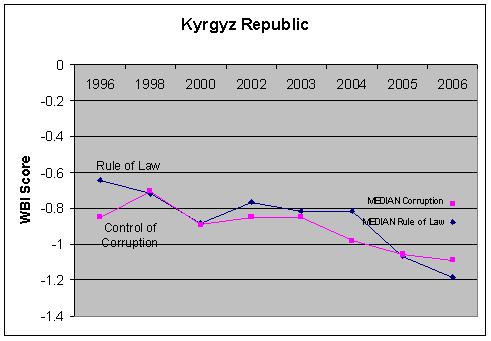*This is a joint posting by Sarah Rose and Sheila HerrlingInitially opposed to the selection of the Kyrgyz Republic as a Threshold eligible country in FY2006, the timing now appears right for the $16 million
Threshold program the Board approved for the Central Asian republic on August 9.The Kyrgyz Republic, when it was selected as Threshold eligible in FY2006, had failed every Ruling Justly indicator for three years in a row (with passable performance on Investing in People and Economic Freedom). At that rate, designing a targeted Threshold program to actually get the Kyrgyz Republic over the hurdle to eligibility would have been difficult, considering the range of interventions necessary to address all the indicators in question; thus it
should never have been selected.However, it looks like the MCC is taking advantage of a key, two-part window of opportunity in the Kyrgyz Republic. First of all, the new data from Freedom House and the World Bank Institute that will be used for the FY2008 Ruling Justly indicators show that while the Kyrgyz Republic will still fail all six indicators, it will score exactly the median score for three of them (Voice and Accountability, Government Effectiveness and Civil Liberties). Voice and Accountability, in particular, has been on an upward trend since 2003.Through judicial reform, law enforcement reform, and criminal justice reform assistance, the Kyrgyz Republic’s Threshold Program targets two of the three indicators that it fails more substantially, Rule of Law and Control of Corruption. These two indicators have shown a pretty consistent decline since 2002-2003 (see below).

It is unlikely that Threshold assistance--even if it does help improve the targeted indicators (keeping in mind that the attribution of governance reforms to Threshold Program interventions is always
tricky)--will be sufficient to get these two over the passing hurdle. However, the second part of that window of opportunity in the Kyrgyz Republic is that the current government, the opposition and civil society groups are more or less forming a united front in support of governance reform. The government has recently taken on a number of initiatives to make the judiciary more independent, transparent, effective, and decentralized, and the MCC is hoping its assistance can help give those reforms and reformers a boost by providing resources and confirming their importance.The bigger issue for the MCC is to more clearly define its Threshold Program. Is it going to be a kind of "risk capital" account to support reformers at critical junctures without any expectation that the program will push failing indicators to passing? Or is it explicitly designed to help a small handful of countries truly on the cusp of full eligibility to pass and spend two years getting oriented to doing business with the MCC so it can hit the ground running should it become compact-eligible? Both have credible arguments, but the time for clarity has come.
CGD blog posts reflect the views of the authors, drawing on prior research and experience in their areas of expertise.
CGD is a nonpartisan, independent organization and does not take institutional positions.






